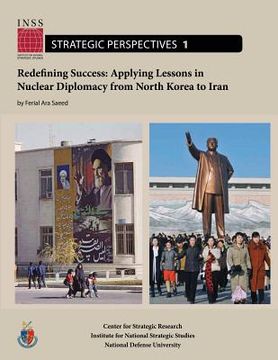Redefining Success: Applying Lessons in Nuclear Diplomacy from North Korea to Iran: Institute for National Strategic Studies, Strategic Pe (en Inglés)
Reseña del libro "Redefining Success: Applying Lessons in Nuclear Diplomacy from North Korea to Iran: Institute for National Strategic Studies, Strategic Pe (en Inglés)"
The United States has no good options for resolving the North Korean and Iranian nuclear challenges. Incentives, pressures, and threats have not succeeded. A military strike would temporarily set back these programs, but at unacceptable human and diplomatic costs, and with a high risk of their reconstitution and acceleration. For some policymakers, therefore, the best option is to isolate these regimes until they collapse or pressures build to compel negotiations on U.S. terms. This option has the veneer of toughness sufficient to make it politically defensible in Washington. On closer scrutiny, however, it actually allows North Korea and Iran to continue their nuclear programs unrestrained. It also sacrifices more achievable short-term goals of improving transparency and securing vulnerable nuclear materials to the uncertain long-term goal of denuclearization. Yet these short-term goals are deemed critical to U.S. national security in the 2010 Nuclear Posture Review (NPR) and Quadrennial Defense Review (QDR). North Korea and Iran are very different states that share at least one crucial similarity: decades of estrangement from Washington and U.S. efforts to isolate them from the international community. They also play destabilizing roles in the regions they inhabit, lack respect for basic democratic freedoms, and maintain policies antagonistic to the United States, its friends, and its allies. It is hardly surprising that the Washington consensus still supports isolation. What is striking, however, is the pronounced international consensus in favor of engagement, which sharply constrains an already limited U.S. policy arsenal. Assessing two decades of nuclear diplomacy with North Korea and nearly a decade of efforts with Iran, it is clear that Washington needs a more promising strategy. Nothing short of a paradigm shift away from denuclearization is required to alter the pattern of bad outcomes in both cases. The new paradigm, predicated on strong bipartisan support, would recognize the national security advantages of a negotiated nuclear pause as a prelude to denuclearization. Allowing North Korea and Iran to retain their current nuclear capability would give them an important incentive to cooperate with international monitoring aimed at improving the transparency of their nuclear programs and capabilities, and securing vulnerable nuclear materials-the goals identified by the NPR and QDR as vital to national security. Denuclearization would remain the publicly declared-and indeed desired-endstate of negotiations, but an outcome requiring a long time horizon to achieve. In the meantime, a nuclear pause diminishes the risk of further nuclear advances by these states and brings North Korea and Iran "inside the tent" through international monitoring. It also buys time to develop new policy mechanisms to further contain their programs. More crucially, it could open up political space in both states for moderation overall, including accommodation (vice defiance) of international demands, especially on the nuclear issue. This comparative study of U.S. nuclear diplomacy toward North Korea and Iran suggests that the North Korea case offers policymakers crucial lessons applicable to Iran. It provides policy recommendations based on four key conclusions: that a common paradigm (nuclear pause) must be applied to both states; that nuclear deals negotiated with international outliers like North Korea and Iran must draw on widely accepted policy or practice; that these deals should be linked to political/diplomatic strategies relevant to the domestic and regional policy context of each state; and that the success of a nuclear pause must be judged by whether it accomplishes nuclear policy goals, not broader policy goals. Time is of the essence. North Korea's leadership transition could prove destabilizing to the region, and Iran's enrichment capability is steadily advancing.

